What to Know About CBD (Cannabidiol)
Cannabidiol is a phytocannabinoid which was discovered in 1940. It is one of more than 120 compounds called cannabinoids in cannabis plants and accounts for up to 40% of the plant’s extract. Many people use CBD oils and extracts to relieve symptoms of chronic pain as it is one of the compounds that produces medical affects without producing euphoric or “high” feelings. Many people are more familiar with THC, tetrahydrocannabinol, which does produce a “stoned” feeling because of the receptors in the body that it affects, which Cannabidiol does not.
CBD has been reported to cause symptom relief by preventing absorption of anandamide, which has been reported to aid in the relief of several symptoms, including both acute and chronic pain, muscle spasm, inflammation, anxiety, seizures, and psychosis to name a few. Some conditions associated with these symptoms that CBD has been reported to relieve include arthritis, multiple sclerosis, chronic pain syndromes, insomnia, drug withdrawal, epilepsy, anxiety disorders, schizophrenia, Alzheimer’s, acne, type 1 diabetes, and cancer, among others.

There have been some identified side effects to be aware of which include tiredness, diarrhea, changes in appetite, weight gain or weight loss, and the use of CBD extracts can cause certain other medications to be more or less effective. Also, long term effects need further research.
Each state may have different legality regarding CBD oil. Section 7606 of the 2014 Farm Bill is the only federal hemp legislation that includes “floral extracts” (flower) in its definition. Hemp grown under section 7606 is not considered marijuana and does not fall under DEA jurisdiction and this was confirmed publicly by chuck Rosenberg (acting head of DEA) in front of a congressional hearing on April 6th, 2017. Maryland does not have any state laws against the production or use of hemp-derived CBD extracts, making it fully legal in this state under federal law.
While symptom relief has been reported by patients using CBD, the FDA has yet to confirm scientific evidence that this is the case. Always consult your physician prior to adding a new substance like CBD to your pain-relief regimen, as it may counteract the effects of other medications or supplements that you could be taking.
